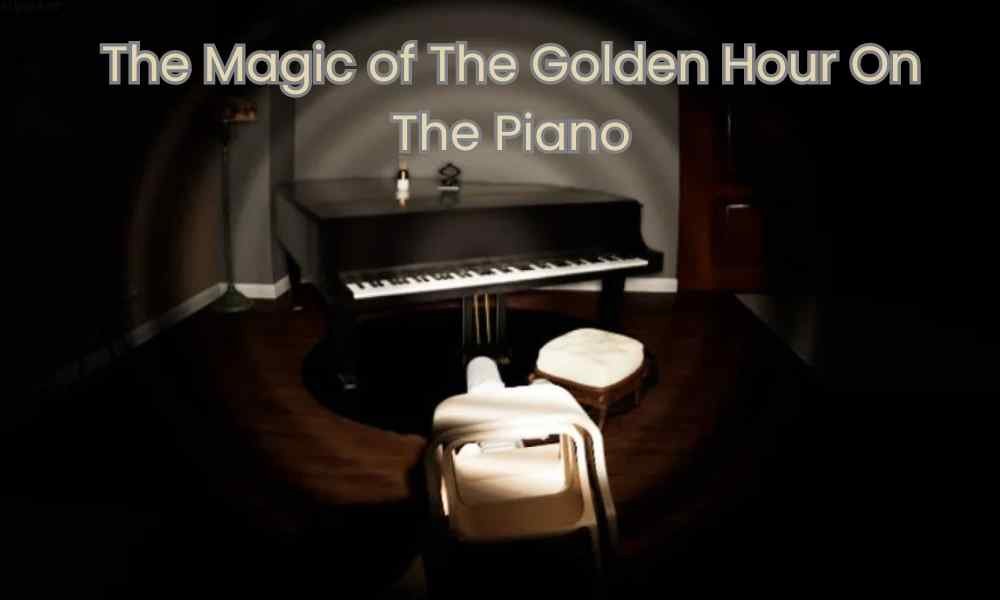The “golden hour” is a term often used in photography to describe the period shortly after sunrise or before sunset when the light is soft, warm, and perfect for capturing beautiful images. However, the concept of the “golden hour” can be applied to many different fields, including music. When talking about the “golden hour piano,” we are referring to a special time when playing or practicing the piano feels particularly magical and inspiring. This article will explore the idea of the golden hour piano, why it matters, and how you can find your own golden hour to make the most of your musical journey.
What is the Golden Hour Piano?
The golden hour piano is not about a specific type of piano or a particular genre of music. Instead, it refers to a period during the day when the conditions are ideal for playing the piano. During this time, everything seems to align perfectly, allowing pianists to create beautiful music effortlessly. This special time can vary for each person, depending on their daily routine, energy levels, and personal preferences.
How To play Golden Hour on Piano
Playing “Golden Hour” on the piano can be a delightful experience. Here’s a step-by-step guide to help you learn and play this beautiful piece. For this example, we’ll focus on a general interpretation of a soothing and expressive piece that might evoke the feelings of a “golden hour.”
Golden Hour on the piano: finding your way around the keyboard
Discover the magic of the “Golden Hour” on the piano! This special time is perfect for beginners to explore the keyboard. Piano practice during golden hour helps you start by familiarizing yourself with the keys and their names. Practice playing simple melodies and scales to build confidence. Remember, the more you play during this golden time, the more comfortable you’ll become with finding your way around the piano. Enjoy your musical journey
Why is the Golden Hour Important for Pianists?
Enhanced Creativity and Inspiration:
During the golden hour, many musicians find that their creativity and inspiration are at their peak. The calm and serene environment allows for deeper emotional connections with the music, leading to more expressive performances.
Improved Focus and Concentration:
Playing the piano requires a high level of concentration. The golden hour provides a quiet and distraction-free environment, making it easier to focus on the music and practice effectively.
Optimal Energy Levels:
Each person has a different time of day when they feel most energetic and alert. For some, it might be early in the morning, while for others, it could be in the evening. Finding your golden hour means playing when you are at your best physically and mentally.
Golden Hour Piano Emotional Connection:
Music is a powerful medium for expressing emotions. During the golden hour, the tranquil atmosphere helps pianists connect with their feelings and convey them through their playing, resulting in more heartfelt performances.
How to Find Your Golden Hour
Experiment with Different Times:
Try playing the piano at various times throughout the day to see when you feel most comfortable and inspired. Pay attention to your energy levels and how you feel emotionally.
Create a Routine:
Once you find your ideal time, try to make it a part of your daily routine. Consistency helps in building a habit and making the most of your piano playing golden hour.
Eliminate Distractions:
Ensure that your environment is free from distractions during your golden hour. Turn off your phone, close the door, and create a peaceful space where you can focus solely on your music.
Listen to Your Body:
Your golden hour can change over time based on your lifestyle and health. Be flexible and adjust your playing schedule if you notice that a different time of day works better for you.
Making the Most of Your Golden Hour
Warm-Up: Start with some gentle warm-up exercises to get your fingers and mind ready for playing. This helps in preventing injuries and ensures a smoother playing experience.
Set Goals: Have clear goals for what you want to achieve during your golden hour. Whether it’s mastering a new piece, improving your technique, or simply enjoying playing, having a focus will make your practice more productive.
Record Your Sessions: Recording your playing during the golden hour can help you track your progress and identify areas for improvement. It also allows you to relive those magical moments and share them with others.
Enjoy the Process: The golden hour is not just about achieving perfection but also about enjoying the process of making music. Allow yourself to get lost in the music and embrace the joy it brings.
Conclusion
The golden hour piano is a concept that highlights the importance of finding the right time to play the piano when you feel most inspired and focused. By experimenting with different times, creating a routine, and making the most of this special period, you can enhance your musical journey and experience the true magic of playing the piano. So, find your golden hour, sit at the piano, and let the music flow.
FAQs About the Golden Hour Piano
1. What is the golden hour piano?
The golden hour piano refers to a period during the day when playing the piano feels particularly magical and inspiring. It’s a time when conditions such as light, mood, and energy levels align perfectly, making piano practice and performance more enjoyable and effective.
2. Why is it called the “golden hour”?
The term “golden hour” is borrowed from photography, where it describes the time shortly after sunrise or before sunset when the light is soft and warm. In the context of piano playing, it symbolizes a time when everything aligns to create an ideal environment for making music.
3. How can I find my golden hour for playing the piano?
Experiment with playing the piano at different times throughout the day to see when you feel most inspired and focused. Pay attention to your energy levels and emotions, and choose the time that feels best for you.
4. Does the golden hour vary from person to person?
Yes, the golden hour varies for each individual. Some people might find their golden hour early in the morning, while others might feel more inspired in the evening. It depends on your personal routine, energy levels, and lifestyle.
5. Can my golden hour change over time?
Yes, your golden hour can change based on your lifestyle, health, and other factors. Be flexible and willing to adjust your playing schedule if you find that a different time works better for you over time.
6. How can I make the most of my golden hour?
To make the most of your golden hour:
- Warm up with some gentle exercises.
- Set clear goals for your practice session.
- Eliminate distractions and create a peaceful environment.
- Record your sessions to track progress and enjoy the process of making music.
7. What if I can’t find a specific golden hour?
If you can’t pinpoint a specific golden hour, focus on creating a regular practice routine that fits your schedule. Consistency is key, and over time, you may naturally discover when you feel most inspired and focused.
8. Do I need special equipment or settings for the golden hour piano?
No special equipment is needed. However, creating a comfortable and distraction-free environment can enhance your golden hour experience. This might include adjusting lighting, minimizing noise, and ensuring your piano is in good condition.
9. Can the golden hour piano improve my playing skills?
Yes, practicing during your golden hour can lead to better focus, creativity, and emotional connection with the music, which can improve your playing skills over time.
10. Is the concept of the golden hour piano scientifically proven?
While the specific concept of the golden hour piano isn’t scientifically proven, the idea of finding an optimal time for creativity and focus is supported by research in psychology and productivity. Different people have peak times for cognitive performance and creative thinking.
11. Can beginners benefit from finding their golden hour?
Absolutely! Beginners can benefit greatly from finding their golden hour. Practicing when you feel most inspired and focused can make learning more enjoyable and effective, helping you progress faster and stay motivated.
12. Can I have more than one golden hour in a day?
Yes, it’s possible to have more than one golden hour in a day. Some people might feel inspired and focused during multiple periods, such as early morning and late evening. Listen to your body and mind to determine the best times for you.
13. How to play golden hour on the piano?
To play “Golden Hour” on the piano, start by learning the basic chords and melody of the song. Practice slowly, focusing on hand coordination and smooth transitions between chords. Gradually increase your speed as you become more comfortable with the piece.



